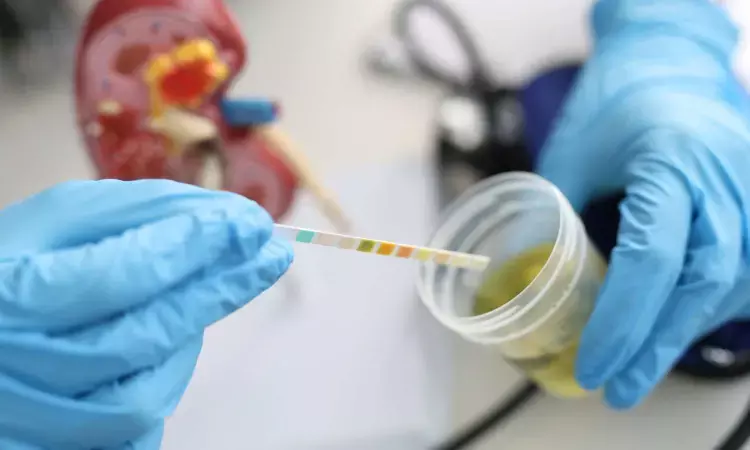- Home
- Medical news & Guidelines
- Anesthesiology
- Cardiology and CTVS
- Critical Care
- Dentistry
- Dermatology
- Diabetes and Endocrinology
- ENT
- Gastroenterology
- Medicine
- Nephrology
- Neurology
- Obstretics-Gynaecology
- Oncology
- Ophthalmology
- Orthopaedics
- Pediatrics-Neonatology
- Psychiatry
- Pulmonology
- Radiology
- Surgery
- Urology
- Laboratory Medicine
- Diet
- Nursing
- Paramedical
- Physiotherapy
- Health news
- Fact Check
- Bone Health Fact Check
- Brain Health Fact Check
- Cancer Related Fact Check
- Child Care Fact Check
- Dental and oral health fact check
- Diabetes and metabolic health fact check
- Diet and Nutrition Fact Check
- Eye and ENT Care Fact Check
- Fitness fact check
- Gut health fact check
- Heart health fact check
- Kidney health fact check
- Medical education fact check
- Men's health fact check
- Respiratory fact check
- Skin and hair care fact check
- Vaccine and Immunization fact check
- Women's health fact check
- AYUSH
- State News
- Andaman and Nicobar Islands
- Andhra Pradesh
- Arunachal Pradesh
- Assam
- Bihar
- Chandigarh
- Chattisgarh
- Dadra and Nagar Haveli
- Daman and Diu
- Delhi
- Goa
- Gujarat
- Haryana
- Himachal Pradesh
- Jammu & Kashmir
- Jharkhand
- Karnataka
- Kerala
- Ladakh
- Lakshadweep
- Madhya Pradesh
- Maharashtra
- Manipur
- Meghalaya
- Mizoram
- Nagaland
- Odisha
- Puducherry
- Punjab
- Rajasthan
- Sikkim
- Tamil Nadu
- Telangana
- Tripura
- Uttar Pradesh
- Uttrakhand
- West Bengal
- Medical Education
- Industry
Higher urine-to-plasma urea ratio tied to increased risk of CKD progression: Study

USA: A study of a large cohort of patients with common forms of CKD (chronic kidney disease) found an independent association of the urine-to-plasma ratio of urea ([U/P]urea) with disease progression and incident kidney failure. The findings appeared in the American Journal of Kidney Diseases on November 07, 2022.
An association of urinary concentrating capacity with CKD progression, independently of glomerular filtration rate (GFR), supports the notion that a more comprehensive assessment of kidney function than is typically performed in clinical practice today, might improve risk prediction. The GFR, despite being the primary indicator of kidney function, does not fully capture the kidneys' state of health, even with the addition of albuminuria. In a large cohort of patients with common forms of CKD, researchers found that a lower [U/P]urea was associated with more rapid eGFR decline and the development of kidney failure independently of other major risk factors for CKD progression.
The key findings of the study were as follows:
- Median (interquartile range) [U/P]urea was 14.8. Compared to participants in the highest [U/P]urea quintile, those in the lowest quintile had a greater eGFR decline by 1.06 ml/min per 1.73m 2 per year over 7.0 years of follow-up.
- Each 1 standard deviation decrease in natural log-transformed [U/P]urea was independently associated with CKD progression (HR 1.22) and incident ESKD (HR 1.22). Associations differed by baseline eGFR.
- Among those with an eGFR ≥30 ml/min per 1.73m 2 , each 1 standard deviation decrease in log-[U/P]urea was independently associated with CKD progression (HR 1.30), but this was not significant among those with eGFR <30 ml/min per 1.73m 2 (HR 1.00).
Urea distinguishes itself from many other proposed biomarkers of tubular function by its central role in kidney physiology. Moreover, it is easily measured at a low cost in most clinical laboratories using standardized assays. Thus, [U/P]urea could represent an accessible marker of CKD progression, not only in ADPKD, but in forms of CKD with high prevalence.
Reference:
Jing Liu, Lise Bankir, Ashish Verma, Sushrut S. Waikar, Ragnar Palsson, Published:November 07, 2022DOI: https://doi.org/10.1053/j.ajkd.2022.09.010
Dr Kamal Kant Kohli-MBBS, DTCD- a chest specialist with more than 30 years of practice and a flair for writing clinical articles, Dr Kamal Kant Kohli joined Medical Dialogues as a Chief Editor of Medical News. Besides writing articles, as an editor, he proofreads and verifies all the medical content published on Medical Dialogues including those coming from journals, studies,medical conferences,guidelines etc. Email: drkohli@medicaldialogues.in. Contact no. 011-43720751


